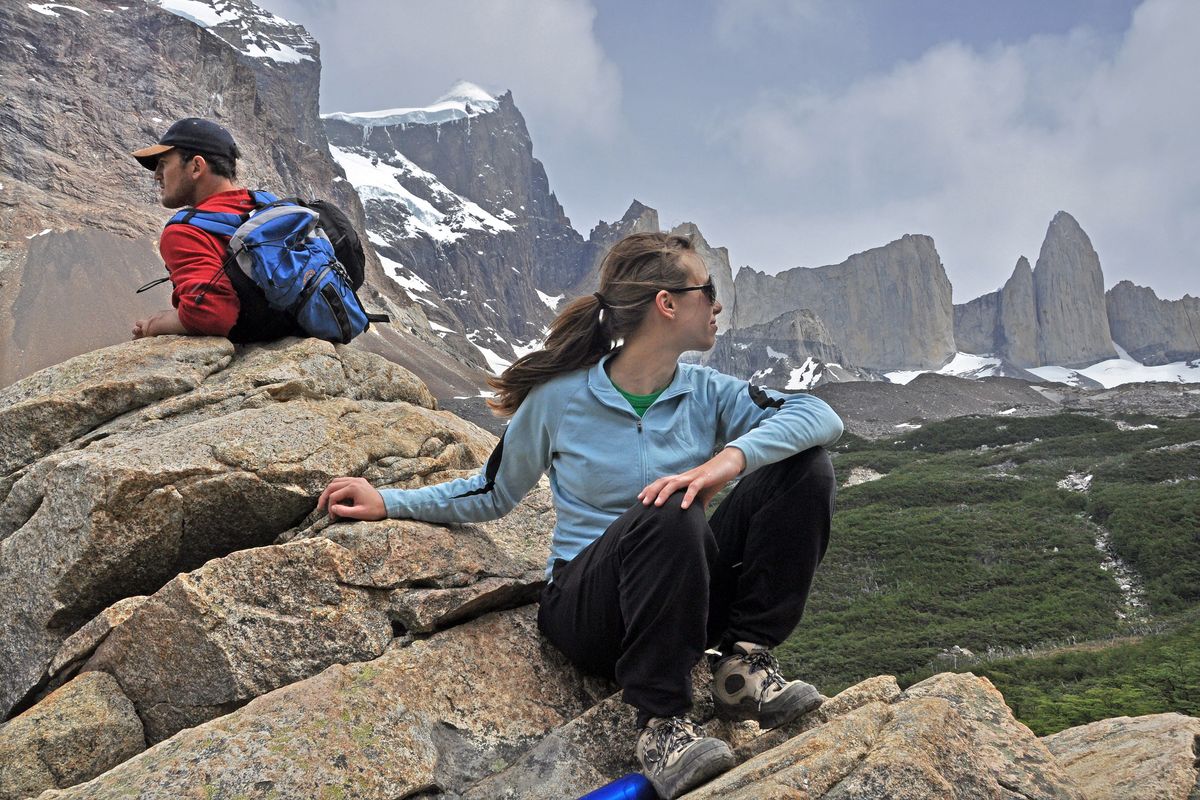If young adults let you tag along, go

I’ve always advised my two daughters to take advantage of opportunities.
Now I’m practicing what I preach, shadowing them occasionally as they open doors in their ever-more-independent lives.
My wife, Meredith, and I know we’re not the only parents to take this “spend it with them, not on them” approach, but I’m writing this for parents who might need encouragement to go for it.
Tagging along with young adults – near or far – is as full of discoveries as following a dog with a good nose through unfamiliar fields.
Maybe it’s the tradition of camping, backpacking, canoeing and nordic skiing trips we built into the family vacation schedule from the outset – or maybe it’s just a miracle that our two daughters still make time in their busy 20-something schedules to include Mom and Dad, especially if it involves some sort of outdoor adventure.
Our youngest daughter, Hillary, was in a college study-abroad program in Chile last year. When she invited me to visit in July during her “winter” break, I hesitated about two seconds before scrapping my plans for an Alaska salmon fishing trip.
“Can’t change your mind now,” I Skyped her 50 minutes later. “I got a nonrefundable ticket.”
The trick to maximizing the opportunity is to join them in the new environment and lifestyle they have discovered.
We rode buses instead of renting cars, chose young traveler-rich hostels instead of hotels, hit the markets for bargains instead of always eating out and, when we visited Easter Island, we traveled by bicycle and slept in a tent near the spray of crashing waves.
It doesn’t get much better than that with your kid.
I digress with a tip for parents of college students: Washington state schools (and others, of course) have foreign language study programs that place students with host families in countries where they go to school and compile credits toward graduation just as they would in the U.S. with the advantage of absorbing a new culture.
It’s one of the best bargains in education, costing the same as state tuition, room and board, plus air fare.
If they have the proper background and apply themselves while abroad, the students also nail a second language. Priceless.
This is an opportunity we’ve mined with both daughters. Our oldest, Brook, also is a Spanish speaker. She chose Spain for foreign study.
We’ve operated on the theory that every family vacation ought to be grounded with a certain amount of squatting behind a bush or, at the least, some orientation to an outhouse. So it was no surprise Brook suggested the family join her for hiking in the Pyrenees at the end of her year abroad.
We capitalized on Brook’s inside understanding of the culture as well as her language skills as we traveled. We joined her to revisit what she considered the high points during her previous hiking adventure on the 480-mile Camino de Santiago de Compostela (pilgrimage route of St. James).
Trust me: This was far more enlightening that waiting for her to return to the States and offer a recap.
I’ll never forget waiting for Brook, who’d strayed from the family on a trail in the Picos de Europa. When she finally caught up, she was striding along and singing heartily with a hiking club of Spanish men in their 60s and 70s.
“These are my new friends,” she beamed. “They’re teaching me dialects.”
The men shook my hand, patted me on the back and handed me pins off their hats when they learned I was her papa.
This was among countless doors she opened on that trip into her new world.
Similarly, Hillary invited the family to join her for backpacking in Chile’s southern Patagonia region when she finished her year abroad in December.
She opened doors by bringing her Chilean friend, Philippe, who tutored us for two weeks on the culture. He led us on a visit to the family farm, where his grandfather offered a moving first-hand account of Chile’s transition through communism, dictatorship and democracy.
A few points to remember for parents who build up the courage to travel with 20-somethings:
•They’re younger.
Maybe that’s how we ended up hiking 20 miles our first day in Torres de Paine National Park.
•They resist making reservations and commitments in favor of last-minute bargains and opportunities.
Hillary was proud to have planned a trip itinerary that included an overnight bus leg to save the cost of accommodations. At the price of torturing her parent’s less-flexible bodies, she saved even more by booking “classico” seats instead of the more expensive seats that fold into beds.
•The maturing process isn’t complete, so expect a certain amount of family tension.
Hillary misplaced her passport at the Dallas airport and I was giving her a stern lecture in responsibility as we frantically dug through her pack. I was getting really steamed about the prospects of missing our next flight and on the verge of sending her to time-out or whatever you do to discipline 20-somethings, uh, until I found her passport in my pocket.
•Young adults always have the reserves to go another hour, even if it’s into the night, but rarely do they have enough youthful enthusiasm to get up early unless drastic measures are employed, such as loudly nibbling at their chocolate ration.
•Some of the old parenting skills never lose their punch.